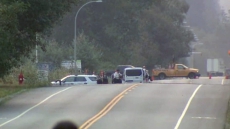Vancouver Police today released proposed “access without fear” guidelines, which formalize the VPD’s approach to enhancing the safety of undocumented immigrants. The guidelines encourage access to police services for people with uncertain or no immigration status.
The guidelines give direction to police officers to not elicit information about the immigration status of a witness, complainant or victim, and not to enlist the assistance of Canada Border Services Agency on any investigation about a witness, complainant or victim, unless there is a legitimate, bona fide reason to do so.
Even in the absence of official access without fear guidelines for police services, the enforcement of immigration offenses has not been a priority for the VPD. From 2015 to 2017, immigration arrests in Vancouver accounted for only 0.01 per cent of all calls for a police response. In addition, Vancouver Police have consistently stated that undocumented migrants, who are victims of, or witnesses to, crime, should not be fearful of coming to the police for help, as the VPD’s primary concern is investigating the crime itself.
In April 2016, city council for the City of Vancouver unanimously passed the City’s access without fear policy. At that time, council requested that the Vancouver Police Board consider adopting policy, within the VPD’s mandate, in support of the City’s policy.
New #VPD guidelines aim to facilitate access to police services for undocumented migrants: https://t.co/tFJ4l0JVZ6
— Vancouver Police (@VancouverPD) July 17, 2018
The VPD has been in discussions with the City of Vancouver about the issue since 2014 and has participated in the Mayor’s Working Group on Immigration and in town hall meetings during the development of the City’s policy. The VPD has also consulted other relevant and interested stakeholders on the policy over the past two years.
The VPD will deliver training on the new guidelines to ensure police officers understand its intent and how it may impact their day-to-day work. The VPD will also provide a point of contact if concerns arise.
The Vancouver Police Board will review the guidelines at a board meeting on Thursday.
VPD Guidelines on Access to Police Services Without Fear
The VPD has created guidelines to ensure that victims, witnesses, and complainants may access police services without fear. The VPD will provide direction to members to not ask about a victim’s, witness’, or complainant’s immigration status, nor communicate with CBSA regarding their immigration status, during the course of a police investigation, unless bona fide reasons exist. The guidelines are philosophically consistent with other VPD policies that strike an appropriate balance between societal interests and policing needs.
For example, the VPD acknowledges that individuals may be reluctant to contact the police in drug overdoses for fear that they will be arrested. Therefore, the VPD has guidelines in place for police who attend illicit drug overdoses, which outline that the primary reason for police attendance at a non-fatal drug overdose is to assist with life saving measures. It would be in rare circumstances that criminal charges would arise from attendance at a routine drug overdose call.
Guidelines
The VPD is mindful of the challenges undocumented migrants face. The protection of the public is without question the central objective of the VPD, one which applies equally to all people regardless of their immigration status.
As an organization which has made advocacy for marginalized and vulnerable residents a dedicated priority, the VPD remains committed to social responsibility and recognizes the importance of making its services and protection equally accessible to all members of the public. In addition, it is the vision of the VPD “to be the safest major city in Canada,” a vision of safety which extends to the protection of all people regardless of immigration status.
The focus of the CoV’s ACSWF policy is to offer access to CoV services to all people regardless of their immigration status. In support of the CoV policy, the VPD proposes guidelines that reflect the need for individuals to have access to police services and limit officers from contacting CBSA about a victim’s/witness’/complainant’s immigration status, unless there are bona fide reasons to do so. We recommend these guidelines as they would be consistent with the organizational philosophy espoused in our Sex Work Enforcement Guidelines and our publicly stated approach to marijuana dispensaries.
The VPD acknowledges that the relationship between the VPD and CBSA is of concern to those with uncertain or no immigration status. Specifically, victims, witnesses, and complainants desire access to police services without fear of repercussions due to their immigration status in Canada.
The VPD recognizes that community trust and cooperation are essential components of effective policing and public safety. Victims, witnesses, and complainants are encouraged to cooperate in the reporting and investigation of crime and are essential in the maintenance of public safety.
In an effort to address the concerns of those with uncertain or no immigration status, and still meet public safety obligations, VPD officers should not ask about a victim’s, witness’, or complainant’s immigration status, nor communicate with CBSA regarding their immigration status, during the course of a police investigation, unless bona fide reasons exist or there is a legal requirement to do so. Bona fide reasons may include but are not limited to:

Crown Counsel requiring information for court purposes;
A victim, witness, or complainant may require admission into witness protection;
The information is necessary to prove essential elements of an offence (e.g. identification, etc.); or During the police investigation it is determined that in order to ensure public safety, it is essential to ascertain the immigration status of a victim, witness, or complainant.
When dealing with suspects the VPD will continue to make use of its lawful authorities and relationships established with other law enforcement agencies, including CBSA. These guidelines are not to be construed as prohibiting VPD members from fulfilling their duties under Canadian legislation, including but not limited to the execution of warrants/written orders or conducting CPIC and RMS queries where appropriate.
One of the VPD’s primary roles is to ensure public safety. A key means of meeting this core obligation is the enforcement of relevant municipal bylaws, provincial legislation, and federal statutes. This includes timely and proportional use of the police powers (subsection 55(2) and section 142) under IRPA.
To assist in meeting its public safety obligations, the VPD maintains a lawful working relationship with the CBSA, as we do with other law enforcement partners. This relationship is long-standing and it is expected within Canadian society that law enforcement agencies will cooperate with one another in an effective and lawful manner. Any direction the VPD provides to its members, in an attempt to support the “spirit and objectives” of the CoV’s ACSWF policy, must not undermine the lawful authorities and obligations of VPD members.
These guidelines enable the VPD to meet its lawful obligations and commitments to public safety while addressing the concerns of vulnerable victims, witnesses, and complainants. Further, the VPD will identify a liaison, or point of contact, to assist undocumented migrants who are victims, witnesses, or complainants if specific queries or concerns arise.






